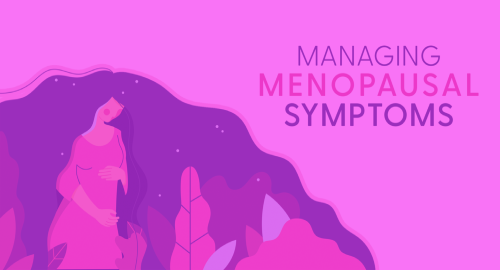- Clinic:
- 0733 945 717
- 0739 434 212

How to cope with unexpected bad medical news
April 26, 2023
What is Caesarean Section?
May 1, 2023Managing menopausal symptoms

The average female life expectancy is increasing, and women can expect to spend about 30 years of their lifetime in the menopause. Studies estimate about a third of the total living women population are in the menopause. If not well managed, menopausal symptoms often lead to a poor quality of life.
Every woman has a pre-determined genetic programming that defines their specific timing of the menopause. This is the point where ovarian function is depleted, with hardly any hormone production, and translating into cessation of periods. The average age of onset is about 51 years.
Symptoms are due to the deficiency of the female hormone, estrogen. The commonest symptoms are hot flushes and night sweats, which affect about 75% of menopausal women. This is accompanied by vaginal dryness, often making sexual intercourse uncomfortable; and urinary symptoms. There are also psychological effects that include depression, anxiety, fatigue, irritability and low esteem. Osteoporosis (brittle bones) and cardiovascular disease are also increased.
General healthy lifestyle measures complement menopausal health. These include physical exercises, good diet rich in calcium, vitamin D and other minerals, reduction in alcohol intake and smoking, and maintenance of psychological health through counseling and stress management.
Hormone replacement therapy (HRT) is the mainstay of treatment of the commonest menopausal symptoms. Patients must be well selected and advised, and the minimum effective dose used for the minimum period of time, usually 2 to 5 years. Most benefits are accrued if HRT is commenced in the period just before the menopause, depending on prevailing symptoms. Hormone replacement comes in various forms that include tablets, patches, implants, vaginal gels and creams etc. If a woman is on HRT, she must get reviewed annually to re-assess the risk-benefit ratio of continued treatment.
HRT has had its place in the media due to potential risks. There is a small increase in the risk of breast cancer, but this risk appears to revert back to the background risk after 5 years of cessation of use. There is also a slightly increased risk of formation of blood clots. Estrogen should not be used alone in women with a uterus, as there is an increased risk of endometrial cancer.
There are other non-hormonal remedies that can be used to control symptoms. These are applicable especially for osteoporosis, and in women who cannot be given HRT due to other prevailing medical conditions. Vaginal dryness can be addressed by use of vaginal lubricants and moisturizers. Vaginal estrogen creams or tablets can also be used, and they also help in urinary symptoms.
There are several other choices that some women consider more natural as menopausal remedies. These include plant products like soy milk, primrose oil, and several herbal products. Some women also benefit from complementary therapies that include acupuncture, reflexology and reiki.
Take a fertility test today
